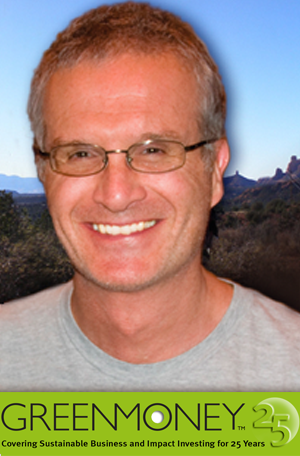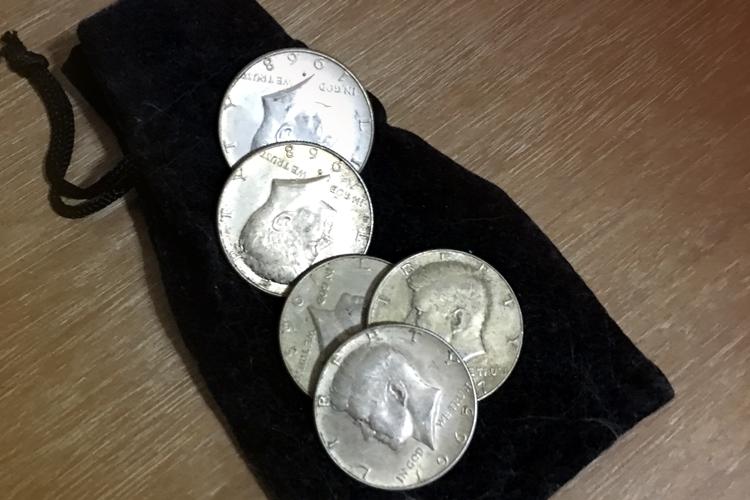The Magic of Money and Other Cautionary Tales
The award-winning publisher tells his story
The Magic of Money and Other Cautionary Tales
by Cliff Feigenbaum, Founder, GreenMoney Journal (celebrating it's 25th Anniversary Year in 2017/18)
It began with a magic trick. My father’s friend would pull a quarter out from behind my ear and then make it disappear again. This became an apt metaphor for my relationship with money: one moment there and the next moment gone, feeding two powerful feelings about money: insecurity and lots of fear about never getting it back.
My second memory of money was of being gifted with silver half dollars on my birthdays (one for every year). Not realizing their worth, I spent a few, but when I moved some years ago I found a stash of them in a small black bag. They are quite special to me.
My family was financially pretty comfortable. We lived in Malibu in the late 60s and the early 70s just a couple of miles from the beach. I had every toy I wanted, with collections of Hot Wheels and baseball cards. But as these things go, change was on the way, a big change. My Dad quit his job as a successful salesman for 3M in LA, deciding with my Mom to move us to the Northwest and buy a turn-of-the-century farm.
It turned out to be a tragic and fatal mistake. They purchased the 70-acre farm in southwestern Washington State with cash. It was quite a place – a hand-built barn and house – we bought it from the very old bachelor farmers who built it. We were ill-equipped to handle the demands of the farm. Within a matter of months I went from the having my feet in sand of Malibu beach to standing on the frozen ground of Washington. Years later my dad told me his biggest financial mistake was not buying the house we lived in back in Malibu. It was a pretty nice place. (In fact we got the word that Bob Dylan rented it after we moved out).
The back-to-the-land thing did not go well. My parents argued as they quickly burned through their capital, and my dad went to work at a real estate office within a year. The stresses of family, dwindling finances, and a farm were extreme and in a few years my dad moved out and my parents divorced. My mom kept the farm but she made many poor life decisions that my brother, sister and I unfortunately had to witness.
Farm life was not for me back then. I began to realize that the only way off the farm was to get “money” to escape. To do what, I was not sure, – just anything but being trapped on the farm. My years in Malibu showed me there was another world out there.
During my senior year in high school I moved off the farm and in with my girlfriend, who was 19 and had a job. After awhile we ended up managing my Dad’s mobile home park. Around that time I also got an American Express card by saying I worked at my Dad’s real estate company. Having a credit card at 18 without a spending limit, – well that was bad, – lots of quick debt.
The month I graduated from high school my Mother at just 40 passed away from a variety of illnesses related to alcohol. I stopped drinking for over a decade, and now drink very little.
After my Mom’s death, my insecurity hit a new low. I decided I needed a real job and began selling shoes at the Kinney shoe store, and was good at it, leading to a promotion as Assistant Manager. I was making my own money but that wasn’t enough. Basically I spent my 20s getting deeply into debt (including going to college) and my 30s getting out.
My credit stabilized in my 40s. When I went to buy my first new car for my fiftieth birthday, my credit score was so high that I could buy any car on the lot. My choice. Who knew paying bills on time could be so powerful?
Back to the timeline… It was May 1980 when Mount Saint Helens blew up in Southwest Washington, just after my dad had created a mini real estate empire by selling dairy farms. His highly leveraged empire collapsed over night, as no one wanted to buy farms near an active volcano. His yearly income went from $200K to $30K in one year, but his expenses stayed high. He had a lot of debt to service and a new young family. He never financially recovered and bankruptcy threatened him constantly. The financial stress was too much and he died on New Years day, just three and a half years after the volcano exploded. He was 46.
During the previous few years I had followed jobs to Spokane, Washington, but I was now alone. My parents only taught me half of the lessons in life: what not to do, but not what to do. Many years would pass before I informally adopted some new parents that helped me see the other side of the coin.
It seemed like I was always broke, living paycheck to paycheck, but finally the old farm sold and I was able to buy a small house in Spokane. It was a safe refuge that I kept for 19 years. I used the money to pay off the small bills first – so I had one less every month.
In 1982 I began going to Whitworth College in Spokane after being let go from my retail job. I was not expecting to be unemployed, so it was devastating and scary. I had never considered myself in college, but then it turned out to be a blessing, as Whitworth, a Presbyterian school, was a wonderful place to learn and find good role models.
Money concerns always haunted me – so during college I had a house full of roommates to pay the bills, as well as part time jobs.
After graduating I found several jobs, but still didn’t get ahead financially, always struggling and a bit fearful. My grandmother was very financially frugal and had built a nice nest egg. When she died she left money to all of the kids and grandkids. For the first time in my life, I could actually breathe, financially. I was still nervous and fearful about debt so I paid off my small home and my car. I thought now no one could disappoint me; I was free. Well sort of… I didn’t want anyone to know I had money because they would try and take it from me.
After my life took a downward turn in a bad relationship I began attending Adult Children of Alcoholics “recovery” meetings every week and continued to attend for 5 years to get my life and my life choices straightened out. It was hard but the meetings really helped. I went to church regularly, learning about living a more generous life. Bottom line, I began a more ethical life, though I still found my risk tolerance rather low.
As my life leveled out I held few jobs, from the business office of a TV station and then at a big hospital where the idea for the GreenMoney Journal first came to fruition. (Read that story from the July/Aug 2017 issue - http://greenmoneyjournal.com/greenmoneys-25-year-journey/ ). One of the main reasons I started GreenMoney Journal and gave talks around town on SRI was to help others work through “money” issues, – to understand how they viewed their money and the self-messages they were using as operating instructions.
I began GreenMoney Journal with a small investment in my own business; as a newly minted entrepreneur, I soon became a workaholic – the “acceptable” form of addiction in our society. I believed in GreenMoney’s mission and it was successful from day one, which fueled the fire.
It was all about investing in the kind of world we want to live in. Can we align our money with our values? But wait, what are our values? How do we know? From which business activities are we willing to profit and which do we purposely avoid?
Now, 25 years later, I am working harder then ever as GreenMoney’s sphere of influence widens. And GreenMoney has changed lives – people continually come up to me at conferences and say they have changed their profession after reading GMJ – motivating them to become financial professionals focused on SRI.
In truth I am still working on my money issues. I find it hard to relax and step away from the ever-increasing demands of our technology-driven world, but I’m working on it.
In closing, I have learned how important it is to be honest about one’s attachments to money. I try to be aware of my attitudes, judgments, and beliefs about the way things “should” be when it comes to money and society (i.e. inequalities), and to think about the personal and ethical implications of the money I spend and invest.
Article by Cliff Feigenbaum, founder, GreenMoney Journal and http://GreenMoneyJournal.com
The GreenMoney Journal was launched in 1992 and was followed by the GreenMoney Journal website in 1995. In 1999, Mr. Feigenbaum co-wrote “Investing With Your Values: Making Money and Making a Difference” published by Bloomberg Press in NYC. In 2013, Mr. Feigenbaum was named “One of the Top 100 Thought Leaders in Trustworthy Business” by Trust Across America. In 2015 and again in 2017, Cliff was named one of the “Leaders in CSR and Sustainability” by Corporate Responsibility (CR) magazine. Most recently, Cliff was the joint recipient of the 2017 SRI Service Award with Rich Liroff of the Investor Environmental Health Network at The 2017 SRI Conference.
=====



